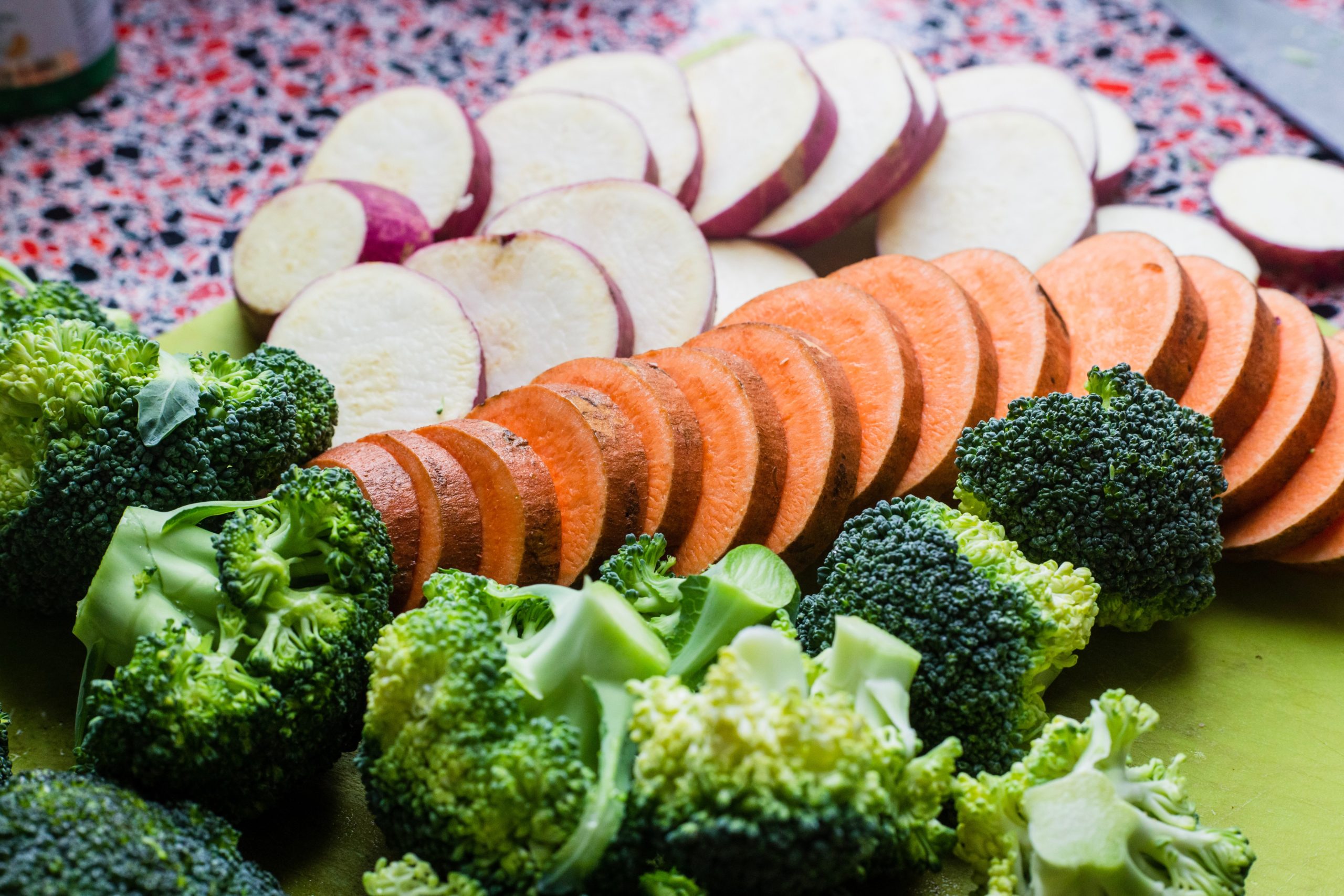This post may contain affiliate links.
So, what exactly are prebiotics and why should you take them? This article is your prebiotic go-to on those questions and more, so keep reading to find out!
Have you ever heard the term “prebiotics” and wondered what they were, and if you should take them?
Prebiotics are not as well known as probiotics, but they’re just as important to your overall gut health. And some people may even argue that prebiotics are more important than probiotics
Probiotics are the beneficial bacteria that live in your gut and keep your digestion and immune system working healthy. They are living organisms that work with your body to help your gut function normally.
Prebiotics are indigestible fibers that feed your beneficial gut bacteria and keep them happy and healthy.
I like to think of prebiotics as the fertilizer for your microbiome. If you’re not regularly feeding your beneficial gut bugs they can’t thrive and grow.
This is the reason why staying on fiber-restricted “gut healing” diets (like low-FODMAP) for too long can actually be harmful to your gut and your microbiome.
With that being said, prebiotics are an integral part of a healthy gut microbiome. And a healthy microbiome often means a healthy and functioning digestive system.
So when you’re thinking about gut health, you should be thinking about prebiotics!
In this article, we’ll dive deep into:
- Exactly what prebiotics do in your gut that makes them beneficial
- Some specific reasons to take a prebiotic
- The different types of prebiotics you can take
If you’re ready to learn more about the benefits of prebiotics and why supplementation might be a good option, let’s go!

How Do Prebiotics work?
Before we dive into the details about WHY you should take a prebiotic, let’s dig a little deeper into exactly what prebiotics do in your gut that make them so beneficial.
Your gut health is the vital backbone of the health of many other body systems. If your gut is struggling, your immune system, hormones, and mental health might also be taking a hit.
And believe it or not, your gut bacteria play a huge role in maintaining health in multiple areas of your body beyond your gut.
Taking prebiotics is one of the many ways you can improve your gut health, and in turn, support the rest of your body as well.
When you expose your gut bacteria to a variety of fibers that only they can digest, they colonize your gut more effectively and produce beneficial byproducts in your digestive tract.
The most notable byproduct of this bacterial fermentation is the Short-Chain Fatty Acid (SCFA), butyrate.
Butyrate is a powerhouse when it comes to gut healing and actually serves as fuel for the cells of your gut lining. This molecule helps to strengthen your gut lining, prevent gut inflammation, and more. Low SCFAs in your gut can mean trouble for your gut health and may even lead to intestinal permeability issues.
Increasing your prebiotic intake through food and/or supplements will increase the amount of SCFAs produced in your gut.
Our gut bacteria are so important to the health of our gut. By providing the food and nutrients you gut bacteria need to be healthy, they keep you healthy in return.
Where Are Prebiotics Found?
Before we talk about prebiotic supplements, I want to make sure you’re aware that the best source of prebiotics is real food… not supplements. Before you start supplementing, I suggest looking at your diet and working on incorporating fermentable fiber-rich foods into your daily meals.
Prebiotics and fermentable fibers are found in a variety of foods, including:
- Bananas
- Onions
- Garlic
- Leeks
- Chicory root
- Asparagus
- Beans, Peas, and Lentils
- Sweet potato/yams
- White potatoes
- Oats
- Apples
- Cabbage
- Leafy greens (Kale, spinach, chard, etc.)
- Barley
- Jerusalem artichokes
- Globe artichoke
- Jicama
- Raw Dandelion Greens
- Cooked and cooled rice
- Mushrooms
- Algae
- Seaweed
- Flaxseeds
- Chocolate!
These fiber-rich foods are fuel for your microbiome. That’s why eating a large variety of plant foods and starches is so important for health, especially gut health. Fiber has so many benefits beyond gut health as well. So eat yo fiber!
Important note: If you can’t tolerate any of these foods, it’s most likely due to a gut infection or dysbiosis issue. Be sure to work with a practitioner if you’re having issues tolerating a higher fermentable fiber diet.

3 Reasons to Take a Prebiotic supplement
Now that we know what exactly prebiotics do that make them so beneficial, and how to get them in your food, let’s look at a few reasons why you should take a prebiotic supplement.
If you know me, you know that I’m not a proponent of taking every supplement under the sun. I’ve seen clients with lists of dozens of supplements they take on a daily basis and it honestly makes me gag to think of swallowing all of those on a daily basis!
Supplement fatigue is real. And to be honest, if you work on addressing the root of your health issues, you shouldn’t need a ton of supplements.
But, when it comes to taking a prebiotic, I am a fan of supplementation in many circumstances. There are so many benefits of prebiotic supplements. Let’s talk about the top three!

Take a Prebiotic to improve Gut Symptoms
If you’re struggling with gut symptoms like gas, bloating, constipation, and/or loose stools, you might benefit from a prebiotic. These frustrating gut symptoms are indicators that there’s an imbalance or issue going on in your gut.
Prebiotics directly impact the health of your gut for the better. So if your digestion is feeling off, adding a prebiotic to your routine could help.
But make sure you go very slowly when adding a prebiotic into your routine if you already have gut symptoms, as initially a prebiotic can make these symptoms worse. And there is definitely such a thing as too much prebiotic consumption!
It’s always important to team up with a trained practitioner to get to the root of your gut issues. That practitioner may recommend a prebiotic to help reduce your symptom severity and improve the quality of your microbiome.
Prebiotics have been shown to improve the symptoms of IBS (like bloating, gas, diarrhea, and constipation).
Beyond improving symptoms, prebiotics can actually aid in the recovery from certain conditions.
Prebiotics may improve lactose tolerance in people who are lactose intolerant. This means that if you’re lactose intolerant, taking prebiotics may help you consume dairy without symptoms.
Prebiotics, along with other measures, may help improve the nutrient status in people with Crohn’s Disease – a condition that affects the intestines and your ability to absorb nutrients from the foods you eat. This could be due to the way prebiotics stimulate gut-healing SCFA production, among other things.
These are just a few of the ways that prebiotics can help to strengthen your gut health. Whether you’re dealing with a few bothersome symptoms or a diagnosed gut condition, adding a prebiotic supplement to your routine could be a good idea.

Take a Prebiotic To improve Your Immune system
Your gut is home to over 70% of your immune system. So, it makes sense that improving your gut health would go a long way in improving your immune health as well.
Most of the immune-boosting benefits that prebiotics offer is due to their ability to feed your beneficial gut bugs and increase the production of SCFAs.
SCFAs help promote the increase of the important immune cells, T regulatory cells.
These cells work to modulate the immune system. This means that they keep the immune system in check – preventing it from attacking things it shouldn’t (like your own body tissue in Autoimmune Disease), and protecting your body from pathogenic invaders when necessary.
New research shows that these T regulatory cells may even be an effective treatment in certain autoimmune diseases.
Now, I don’t think that taking a prebiotic supplement will put your autoimmune disease into remission. But, it can be a small part of an active treatment plan to help improve your wellbeing while living with the condition.
Besides, the immune-supporting benefits of prebiotics can boost anyone’s immune health, not just people with immune-related conditions.
So, if you’re looking to give your immune system a leg-up, adding some prebiotics into your routine won’t hurt.

Take a Prebiotic To Help You Lose Weight
Believe it or not, your gut bacteria play a large role in whether or not you’re able to lose weight.
When your gut bacteria are out of balance, your body tends to move towards a state of low-grade inflammation and immune activation.
This immune response, called metabolic endotoxemia, occurs as a result of the increase in circulating endotoxins produced from the harmful bacteria in your gut.
An increase in inflammation can lead to a host of chronic health conditions like diabetes, metabolic syndrome, and obesity.
Research also suggests that when you’re overweight, your microbiome looks different than someone who is at a healthy weight.
So it makes sense that bringing your gut bacteria back into balance might help to curb the effects of metabolism-affecting inflammation and subsequent weight gain.
Taking a prebiotic supplement can improve a number of biomarkers that are related to obesity, including:
- Fasting blood sugar
- HbA1c
- Fasting insulin
- Inflammatory markers
Plus, prebiotic intake can decrease total calorie intake by increasing satiety. This means when eating fiber-rich foods or taking prebiotics, you’ll feel fuller faster with less food. If you’re struggling with overeating on calories, increasing the satiety of your meals is an easy way to cut back on the excess without feeling deprived.
Taking prebiotics won’t be your magic bullet to help you drop those last few pounds. There are other more important strategies to implement first. But they can help to eliminate any gut or metabolism imbalances that might contribute to your inability to lose weight.

Types of Prebiotics and Where to Find Them
You don’t have to add another supplement to your routine to reap the benefits of prebiotics. There are plenty of food-based forms of prebiotic fiber that can be as beneficial as popping another pill.
With that being said, if you have a health condition that warrants an increase in prebiotics, a supplement will be your best bet at getting a therapeutic dose.
Either way, being intentional about adding prebiotics into your routine has a host of benefits. And choosing the right prebiotic for your specific situation can make all the difference.
Here are the most common types of prebiotics, and where you can find them, in both supplement and food form.
Inulin
Inulin is a type of soluble fiber found in plants.
Studies show that inulin can help to stimulate the growth of beneficial bacteria in your gut. Which is exactly what we want from our prebiotic!
And besides direct impact to your microbiome, taking inulin as a prebiotic can help to relieve constipation, promote weight loss, and improve mineral absorption.
You can either get the prebiotic inulin in supplement form or increase your intake of inulin-containing foods.
Here are some specific foods that are high in inulin:
- Chicory root
- Jerusalem artichoke
- Garlic
- Asparagus
- Onion
- Wheat
Fructooligosaccharides (FOS)
Fructooligosaccharides (known as FOS) are another type of prebiotic fiber that is undigestible by our guts.
This means that when we take a FOS supplement or eat foods containing this fiber, only our gut bacteria are able to digest it.
Besides keeping our microbiome happy and healthy, FOS can help lower cholesterol, and reduce blood sugar by stimulating insulin secretion in the pancreas.
Here are some specific foods that are high in FOS:
- Banana
- Onion
- Garlic
- Yacon root
- Blue agave
- Jerusalem artichoke
- Asparagus
Galactooligosaccharides (GOS)
Galactooligosaccharides (or GOS) are the last type of nondigestible prebiotic fiber that we can use to help feed our microbiome.
GOS is known for its ability to selectively feed the keystone species, Bifidobacteria in your gut.
So, without enough GOS fibers in your diet, your microbiome could be lacking this key player in microbial balance.
Here are specific foods that are high in GOS:
- Legumes
- Beans
- Broccoli
- Fennel
- Jerusalem artichoke
- Lentils

The Bottom Line on Taking a Prebiotic
Prebiotics feed our good gut bacteria. And in return, those beneficial gut bugs help to keep not only our guts but the rest of our body healthy and in balance.
If you’re in good health and eat a diet consisting of a wide range of real food, you likely get plenty of prebiotics from food alone.
But, if you have certain health conditions or are on a fiber-restricted diet, taking a prebiotic supplement will enable you to get a more therapeutic dose.
Either way, being intentional about including prebiotics in your diet is a simple way to improve your gut health, and therefore the health of the rest of your body.
As always, be sure to ask your own healthcare provider for recommendations on specific prebiotic supplements that might work best for you and your health goals.
Do you take a prebiotic? What health improvements have you noticed since adding a prebiotic supplement or eating more prebiotic foods? Share your experience in the comments.


+ show Comments
- Hide Comments
add a comment